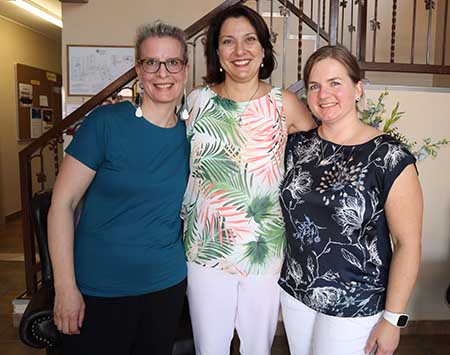In the professional medical and healthcare industry it goes without saying that local experts are often caught up in their own way of doing things.
It is also a fact that the workload of these professionals is so heavy, or their diaries are so jam-packed, that there is seldom time to make use of opportunities where one can learn from international perspectives.
The North-West University’s (NWU’s) School of Nursing recently focused on just that when they invited three experts from Finland to share their European perspectives and experiences with South Africans. Several healthcare professionals from various provinces made time to attend the guest lectures.
Focusing on state-of-the-art healthcare for infants and children at the Satakunta Hospital, Heli Mäkelä, a clinical specialist nurse, shared her experience on family-oriented care in a public women’s and children’s hospital in Finland.
She said that, as Finland has a very low birth rate, it is common for births to receive much attention from their families. Finland has equipped several hospitals in such a manner that they are very family-friendly.
“Apart from the welcoming environment, we also offer several programmes in the hospital before and after birth aimed at empowering and engaging with the whole family. We all know that giving birth to a child can result in an emotional rollercoaster for the whole family, and we want to see that the family establishes the very best relationship with each other and with the baby,” she says.
Elina Botha has worked for eight years as a senior lecturer in midwifery at the Tampere University of Applied Sciences. Previously she worked as a midwife and IVF nurse for several years. Her passion is to mend what is broken between parents and babies, and bring peace and calm to colicky babies and their families.
During her lecture, Elina expanded a lot on colic research. “A baby has to cry. It is the baby’s way of communicating. To try to calm a baby is instinctual, but the ability to do so is a skill that must be learned,” she said.
She also discussed the myths around colic, and shared some scientific facts about it. She says the effect that a colicky baby has on a family can often include exhaustion, breastfeeding failure, marital stress, depression, neglect, and even child abuse and childhood problems. “I think we underestimate the effect that a colicky baby can have on a family. My advice is to get help and not to try and cope on your own,” she said.
An interesting fact is that it is not uncommon for Finnish parents to take paid maternity leave of between one and three years. This is applicable to mothers as well as fathers.
Anne Mäenpää is a senior lecturer in Nursing and Healthcare at the Tampere University of Applied Sciences in Finland. She has experience in paediatric nursing with regard to the emergency room, outpatient clinics, the medical ward, and the intensive care unit. She spoke about child abuse and shared her views of the role that healthcare professionals can play to help to combat this kind of abuse.
“Apart from the physical symptoms of child abuse, there are many emotional symptoms to look out for. These can include an emotional burden, such as anxiety or substance abuse, abdominal pain and headaches, depression, adjustment problems, school-attendance problems, signs of neglect, health problems, and manifestations of signs in the home, e.g. untidiness and clutter,” she said. She made valuable recommendations and discussed a few methods to eliminate this daunting reality.
According to Prof Welma Lubbe, a senior researcher at the School of Nursing, it was great to get an international perspective about their peers’ work and research.
“We are privileged to learn from each other’s cultures and traditions, and how we can implement this modern research and methods to fit into an African perspective. We cherish our relationships with our international academics, and through initiatives like this, we can create the platform from which mothers and babies can only benefit,” she said.

Elina Botha (left) and Heli Mäkelä (right) from Finland recently presented guest lectures at the NWU’s School of Nursing. With them is Prof Welma Lubbe (NWU).
